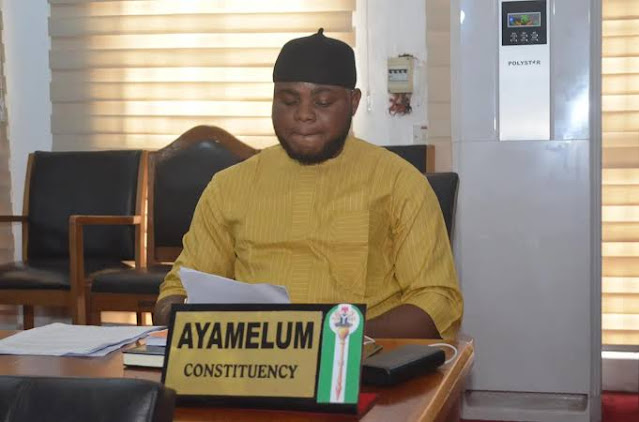Awka, Anambra State – August 26, 2025 – The Anambra State House of Assembly has suspended Bernard Udemezue, the lawmaker representing Ayamelum Constituency, for three months without salary, following a controversial social media post in which he disclosed his allowances and quarterly constituency project funds. The decision, announced during a plenary session on Tuesday, has sparked a heated debate about transparency, accountability, and parliamentary ethics in Nigeria’s political landscape. Udemezue, a vocal critic of the Assembly’s leadership, has denied any wrongdoing, alleging that his suspension is an act of victimization for exposing financial practices that some of his colleagues prefer to keep under wraps.
A Shocking Disclosure Sparks Outrage
The suspension of Udemezue, a first-term lawmaker known for his outspoken nature, stems from a WhatsApp message he shared in a group primarily composed of his constituents in Ayamelum Constituency. In the post, Udemezue revealed details of his emoluments as a member of the Anambra State House of Assembly, including allowances and other financial benefits. Most controversially, he disclosed that each lawmaker receives N10 million quarterly from the state government for constituency projects, a revelation that has ignited a firestorm within the Assembly and among the public.
The WhatsApp message, which quickly circulated beyond the group and gained traction on social media platforms, was perceived by many as a bold move toward transparency. However, it drew sharp criticism from Udemezue’s colleagues, who viewed the disclosure as a breach of parliamentary decorum and an embarrassment to the institution. The House Committee on Rules, Business, Ethics, and Privileges, chaired by Majority Leader Sir Ikenna Ofodeme, representing Ekwusigo Constituency, was tasked with investigating the matter. After a swift review, the committee presented a report during Tuesday’s plenary session, recommending Udemezue’s immediate suspension for three months without pay.
The committee’s report described Udemezue’s actions as “unparliamentary” and damaging to the reputation of the Assembly. It accused him of violating the trust of his colleagues by publicly disclosing sensitive financial information that could undermine public confidence in the legislature. The report further stipulated that Udemezue be barred from entering the Assembly premises during the suspension period, a measure intended to underscore the severity of the punishment.
The Case Against Udemezue
The decision to suspend Udemezue was not taken lightly, according to Assembly members who spoke on condition of anonymity. The controversy began when Udemezue’s WhatsApp message, intended for his constituents, was leaked to a wider audience, prompting outrage among his peers. The message detailed not only his personal allowances but also the N10 million quarterly allocation provided to each lawmaker for constituency projects—funds meant to support infrastructure, education, healthcare, and other development initiatives in their respective constituencies.
While transparency in governance is a growing demand across Nigeria, the Assembly leadership argued that Udemezue’s approach was reckless and inappropriate. “The House of Assembly operates on principles of collective responsibility and trust,” said Sir Ikenna Ofodeme during the plenary session. “By making such disclosures in a public forum without consultation, Honourable Udemezue has acted in a manner that undermines the dignity and integrity of this institution.”
The committee’s report highlighted several concerns. First, it argued that Udemezue’s post could fuel public mistrust by suggesting that lawmakers were misusing or mismanaging constituency funds. Second, it accused him of breaching the Assembly’s code of conduct, which emphasizes confidentiality in matters related to internal financial operations. Finally, the committee claimed that Udemezue’s actions could incite unrest among constituents, who might demand greater accountability from other lawmakers, potentially destabilizing the Assembly’s operations.
The recommendation for a three-month suspension without salary was adopted unanimously by the Assembly, reflecting the depth of disapproval among Udemezue’s colleagues. The decision also bars him from participating in legislative activities, including committee meetings, plenaries, and constituency engagements, effectively sidelining him from his duties until late November 2025.
Udemezue’s Defiant Response
Bernard Udemezue, a lawyer by training and a vocal advocate for grassroots development, has remained defiant in the face of his suspension. In a series of statements released to the press and on his social media accounts, Udemezue insisted that he did nothing wrong and that his disclosures were motivated by a desire to be transparent with his constituents. “My sole aim was to update the good people of Ayamelum on my activities as their representative,” he said. “I believe that those who elected me have a right to know how their resources are being utilized.”
Udemezue’s defense centers on the principle of accountability, a cornerstone of democratic governance that has gained increasing prominence in Nigeria amid widespread concerns about corruption and mismanagement. He argued that the N10 million quarterly constituency allocation is public money, and as such, constituents have a right to know how it is spent. “I am not the only one receiving these funds,” Udemezue stated. “Every lawmaker gets N10 million every three months for projects in their constituencies. My crime was telling the truth about it.”
The suspended lawmaker went further, alleging that his suspension was a deliberate act of victimization orchestrated by colleagues who were uncomfortable with his transparency. According to Udemezue, some lawmakers pocket their constituency funds rather than using them for intended projects, a practice he claims is widespread but rarely discussed. “The anger against me is because I exposed a system that benefits a few at the expense of our people,” he said. “Instead of addressing the real issue—how these funds are used—they have chosen to silence me.”
Udemezue’s allegations have added fuel to an already contentious debate, raising questions about the management of constituency funds in Anambra and across Nigeria. Constituency projects, funded through state and federal budgets, are intended to address local needs, such as building schools, roads, and health centers. However, they have long been criticized as a source of patronage and corruption, with lawmakers often accused of diverting funds for personal gain or awarding contracts to cronies. Udemezue’s disclosure has shone a spotlight on these issues, prompting calls for greater oversight and accountability.
Public Reaction: A Divided Response
The suspension of Udemezue has elicited a polarized response from the public, with some hailing him as a champion of transparency and others condemning his actions as reckless and divisive. In Ayamelum Constituency, a rural area in northern Anambra known for its agricultural economy, many residents have rallied behind their representative, praising his courage in revealing details of his allowances. “Honourable Udemezue has shown us what true representation looks like,” said Chukwuma Okeke, a community leader in Anaku, one of the towns in Ayamelum. “We elected him to serve us, not to hide things from us. Why should he be punished for telling the truth?”
Others, however, believe Udemezue’s approach was misguided. Political analyst Dr. Nnamdi Okafor, based in Awka, argued that while transparency is important, Udemezue’s decision to disclose sensitive financial information on social media was “unprofessional and potentially destabilizing.” “There are proper channels for addressing concerns about constituency funds, such as through oversight committees or public hearings,” Okafor said. “By going public in this manner, he risks undermining the entire institution and creating unnecessary tension.”
Social media platforms, particularly X and WhatsApp, have been abuzz with discussions about the suspension. Hashtags such as #UdemezueSpeaks and #AnambraAssembly have trended in Nigeria, with users debating the merits of his actions and the Assembly’s response. Some have called for a broader investigation into constituency funds, while others have accused the Assembly of protecting a corrupt system by punishing Udemezue. “If every lawmaker was as open as Udemezue, maybe we’d have better roads and schools,” one user posted on X. Another countered, “He broke the rules. The Assembly has a right to discipline its members.”
The Broader Context: Transparency in Nigerian Politics
Udemezue’s suspension comes at a time when Nigeria is grappling with growing demands for transparency and accountability in governance. The country has long struggled with systemic corruption, with public officials at all levels facing accusations of mismanaging public funds. Constituency projects, in particular, have been a lightning rod for criticism, with reports of lawmakers diverting funds or executing substandard projects. A 2019 investigation by the Independent Corrupt Practices and Other Related Offences Commission (ICPC) found that over 50% of constituency projects in Nigeria were either poorly executed or never completed, despite billions of naira being allocated annually.
In Anambra, a state known for its vibrant political culture and economic potential, the issue of constituency funds has been a recurring source of tension. The state’s 30-member House of Assembly, dominated by the All Progressives Grand Alliance (APGA), has faced scrutiny over its handling of public funds, with critics arguing that lawmakers prioritize personal enrichment over development. Udemezue’s disclosure has reignited these debates, prompting calls for reforms to ensure that constituency funds are used transparently and effectively.
The suspension also raises questions about the balance between parliamentary privilege and public accountability. Lawmakers in Nigeria enjoy significant autonomy in their operations, including the management of constituency funds, but this autonomy is often criticized as a license for unaccountability. Udemezue’s case highlights the tension between the need for internal discipline within legislative bodies and the public’s right to know how their elected representatives are using taxpayer money.
Political Implications for Anambra
The suspension of Udemezue could have far-reaching implications for the political landscape in Anambra, a state preparing for gubernatorial elections in 2026. The incident has exposed divisions within the Assembly, with some lawmakers reportedly sympathetic to Udemezue’s call for transparency but wary of openly supporting him. The Assembly’s decision to suspend him without salary has also raised concerns about the precedent it sets for dissenting voices within the legislature.
For Udemezue, the suspension is both a setback and an opportunity. While he is barred from legislative activities for three months, he has gained significant public support, particularly among young voters and transparency advocates. Political observers believe he could leverage this support to strengthen his position in Ayamelum and potentially challenge the Assembly leadership in the future. However, his outspokenness may also make him a target for further isolation within the Assembly, where loyalty to the leadership is often prioritized.
The incident has also put pressure on Governor Charles Soludo, a former Central Bank of Nigeria governor known for his economic reforms, to address the issue of constituency funds. Soludo, who has prioritized infrastructure and youth empowerment since taking office in 2022, has remained silent on the Udemezue controversy, but analysts expect him to weigh in as public interest grows. A transparent investigation into the use of constituency funds could bolster his administration’s credibility, while inaction could fuel perceptions of complicity in legislative opacity.
Legal and Ethical Questions
Udemezue’s suspension raises important legal and ethical questions about the rights and responsibilities of lawmakers. Under the Nigerian Constitution and the Anambra State House of Assembly’s standing orders, the legislature has the authority to discipline its members for conduct deemed detrimental to its integrity. However, Udemezue’s supporters argue that his suspension violates his right to free speech and his duty to inform his constituents. “If a lawmaker cannot speak openly about public funds, then what is the point of democracy?” asked Nkechi Okafor, a legal scholar at Nnamdi Azikiwe University in Awka.
The decision to withhold Udemezue’s salary during the suspension has also sparked debate. While the Assembly has the power to impose financial penalties, some argue that denying a lawmaker’s salary for three months is excessive and could deter others from speaking out. Udemezue has hinted at challenging the suspension in court, though he has not yet confirmed whether he will take legal action. “I am consulting with my legal team to determine the next steps,” he told reporters on Tuesday evening. “This is not just about me; it’s about the future of transparency in Anambra and Nigeria.”
Looking Ahead
As Udemezue begins his three-month suspension, the controversy shows no signs of abating. His supporters have vowed to organize rallies in Ayamelum to protest the Assembly’s decision, while civil society groups, including Transparency International Nigeria, have called for an independent audit of constituency funds across the state. The incident has also prompted renewed calls for legislative reforms, such as mandating public disclosure of constituency project expenditures and establishing oversight mechanisms to prevent misuse.
For the Anambra State House of Assembly, the challenge is to restore public confidence while maintaining internal cohesion. The suspension of Udemezue has exposed fault lines within the legislature, and the leadership will need to navigate these tensions carefully to avoid further backlash. Speaker Somtochukwu Udeze, who presided over the plenary session, has defended the suspension as necessary to uphold the Assembly’s integrity, but he faces growing pressure to address the underlying issues raised by Udemezue’s disclosure.
For Udemezue, the coming months will be a test of his resilience and political strategy. By positioning himself as a champion of transparency, he has tapped into a growing public demand for accountability, but he risks alienating powerful figures within the Assembly and the state government. His ability to maintain support among his constituents while navigating the fallout of his suspension will determine his political future.
Conclusion
The suspension of Bernard Udemezue by the Anambra State House of Assembly is more than a disciplinary action; it is a flashpoint in the ongoing struggle for transparency and accountability in Nigerian politics. Udemezue’s decision to reveal his allowances and constituency funds has sparked a vital conversation about the use of public resources, but it has also exposed the challenges of reforming a system resistant to scrutiny. As Anambra grapples with the fallout, the incident serves as a reminder of the delicate balance between parliamentary discipline and the public’s right to know. For now, Udemezue remains a polarizing figure—a hero to some, a disruptor to others—whose actions may shape the future of governance in Anambra and beyond.





